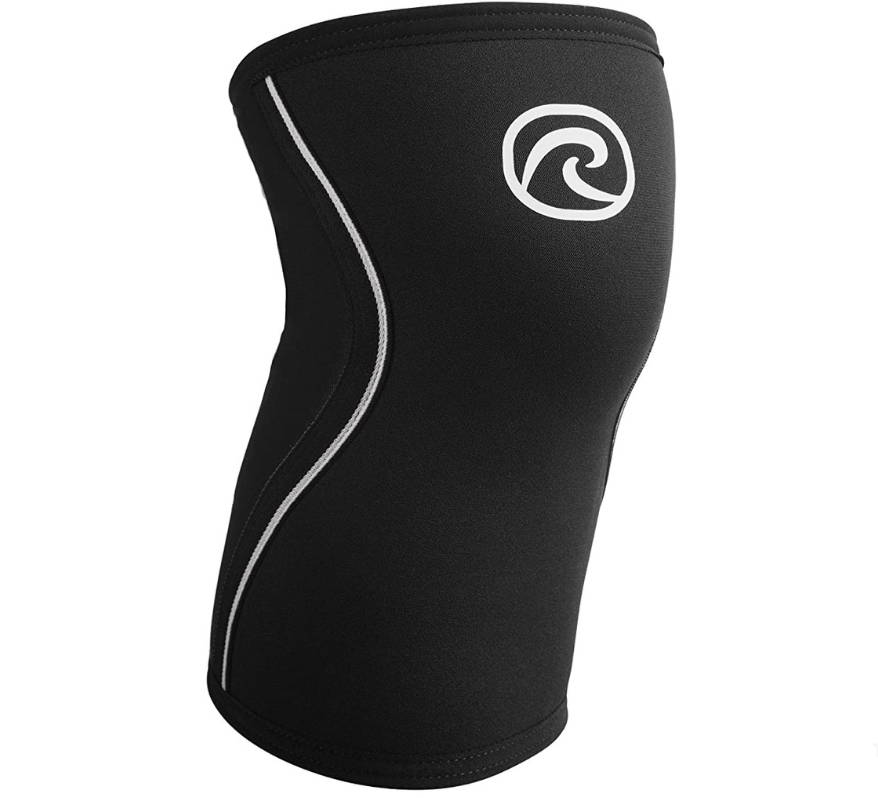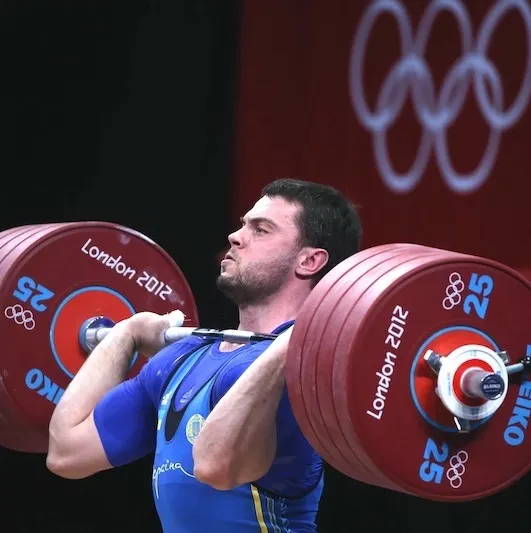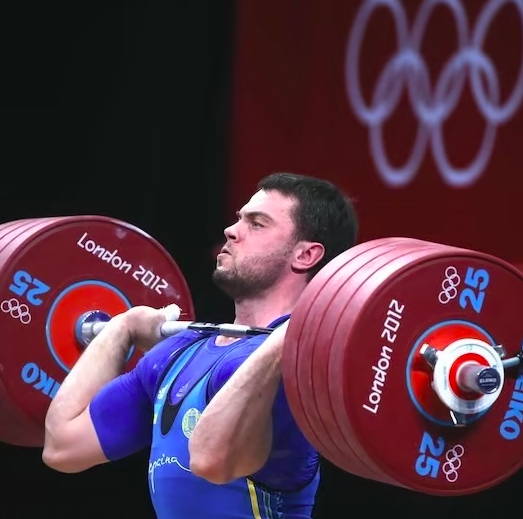Your knees do a lot of work in weightlifting – how do you protect them from injury and soreness? Should you use 5mm vs 7mm knee sleeves?
We’re going to look at both types of sleeves, how they compare, and what each is for – as well as our favorite products for each category.
7mm Knee Sleeves vs 5mm for Weight Training – The difference lays in thickness, flexibility, and amount of support. Thicker sleeves are more supportive but also more restrictive. 5mm Knee sleeves are better for fitness – but 7mm knee sleeves are better for heavy Weightlifting and Powerlifting.

5mm Knee Sleeves
5mm sleeves are perfect for keeping your knees warm and healthy during weightlifting and squats. It’s a neoprene sleeve to provide a little compression, with quite a comfortable design. They feel great on the knees but are noticeably flexible, still.
5mm knee sleeves are ‘normal’ for weightlifting, with a basic and supportive design that keeps the knees warm and healthy. It provides a moderate amount of support to the knees but won’t bunch up behind the knee or restrict any blood flow.
They’re more comfortable for different exercises besides squatting, and they are typically more comfortable to wear around the gym. They don’t offer heavy duty support, but can still be very useful for Olympic lifts – where the knee needs to be able to move freely.
The 5mm knee sleeves are great for general purpose strength training. We particularly like them for fitness and lighter weightlifting, where they are a good balance between extra support and free movement.

5mm Knee Supports: Pros
Lightweight with moderate support for knees
More flexible – less risk of being too small or too tight
Typically higher-strength neoprene designs (but not always)
More comfortable, most of the time – such as walking around the gym
5mm Knee Supports: Cons
Not as supportive as the 7mm sleeves – weaker compression
Doesn’t offer heavy duty support for squatting
May have weaker cuffs and more movement around the knee
When You Need 5mm Knee Sleeves
I like 5mm knee sleeves best for weightlifting – snatches in particular. The knees are not placed under such intense load, and they are more comfortable. 5mm sleeves are also good for cleans, but don’t offer as much support and elastic assistance during heavy cleans.
The 5mm are good for fitness, too, because they are not as thick or restrictive. This makes it easier to perform different types of exercise. With 5mm knee sleeves for fitness, you can perform weightlifting exercises, but you can also skip, run, or do some stationary bike exercises, too.
These make the 5mm a versatile knee sleeve with good variety.
Best 5mm Sleeves We Recommend: Rehband 5mm Knee Support (Pair)
Rehband’s 5mm knee supports are our favorite form of 5mm knee sleeves. They’re comfortable, flexible, and supportive. They’re very well-made with high neoprene concentrations for better elasticity and durability.
This has an ergonomic design, aimed to fit to the contours of the knee for more accurate support. The seams themselves are reinforced and the stitching is high quality to prevent fraying and separation under heavy loads.
These are excellent for heavy fitness and moderate Weightlifting. They’re sold as singles and teach support offers good support, though they could do with a thicker cuff to prevent any slipping – you may want to buy these items a size down, or err downwards when you’re between size ranges.
They’re simple but excellent, and perfect for any kind of exercise.
7mm Knee Sleeves
7mm knee sleeves became more popular in the 2010s, starting in powerlifting, but also becoming popular for weightlifting. They offer more heavy-duty support for the knees and are typically used by heavy squatters. They provide more compression on the knee and more elastic support.
7mm knee sleeves are not only thicker, but also typically made from heavier neoprene with greater density. This means that they bunch up behind the knee more than a 5mm knee sleeve. This is useful for improving the ‘bounce’ you can get out of these sleeves, but makes them a little uncomfortable to wear for repetitive exercise.
A 7mm neoprene knee sleeve offers great support, but you can’t use it for as many purposes as the smaller sleeves. For example, 7mm knee sleeves are not as popular in fitness because they help with squats, but may cause too much restriction around the knee for cycling or running, for example.
You should use 7mm knee sleeves if you’re mostly looking for knee support for squats and cleans. It’s acceptable for snatches, but mainly important in these heavier lifts where the bounce is more important.
You need to be careful with measurements using these thicker sleeves. Getting a size smaller may cause problems, which are less of a problem in the more flexible 5mm sleeves.

7mm Knee Supports: Pros
Strong knee support for better compression and warmth
Heavy duty design and materials produce more bounce in the bottom of a squat
Feels more supportive on the knees – especially for sore knees
7mm Knee Supports: Cons
Too restrictive for some types of exercise
Not as versatile as 5mm knee sleeves
Not as flexible as smaller sleeves – less versatile and require specific sizing
When You Need 7mm Sleweves?
You need 7mm sleeves when you’re performing heavy squats – especially for Powerlifters. They’re also great for weightlifters during cleans, where they provide support for the heavy front squat. You want to bounce right out of a clean without wasting time, making these sleeves better.
The elastic support is more powerful in these two types of exercise, because you’re loading up the elastic and bunching up behind the knee. These are more useful than the 5mm sleeves because of the extra thickness and the denser neoprene concentration of most 7mm knee sleeve designs.
Overall, you should think of 7mm knee sleeves as extra support. They’re going to do everything you need for Powerlifting or Weightlifting, but may be a little too much for fitness or general strength training.
Subscribe!
The latest reviews of must-have home gym training equipment, apparel, and supplements that will enhance your performance and bring you new results.
Best 7mm Knee Sleeves We Recommend: Ironbull Strength 7mm Powerlifting Sleeves
Ironbull Strength 7mm knee sleeves are a great choice for excellent support and great value. They offer a thicker and reinforced neoprene design with a double cuff to prevent slippage and ensure the best performance.
Iron Bull also offer you excellent value, with huge savings over other products on the market like SBD knee sleeves. They’re great for powerlifters and heavy squatting, and they’re more comfortable than most due to the excellent fit and hold-up cuffs.
These sleeves can run a little large, which makes them a great choice if you are looking for a size down. They’re quite well-fitted at the top but may be loose on the lower cuff if you aren’t particularly large through the lower leg.
What About 3mm Sleeves for Lifting?
3mm knee sleeves are comfortable and warm, but they do not provide much significant support. Most people either need to not use knee sleeves, or use a heavier design. There’s no real benefit to 3mm vs 5mm knee sleeves – you may as well go for strong support, or none!
You should either train with bare knees or with some thicker sleeves. If you want support, you want some significant support for your heaviest exercises. If you want to train with less support, then simply don’t use sleeves.
3mm knee sleeves are not very popular for powerlifting or weightlifting because they don’t have much purpose compared to the heavier designs. They’re just as expensive, but offer less benefits!

FAQ
Are Knee Sleeves Supposed To Be Tight?
Yes – knee sleeves should be tight enough to feel ‘snug’ on your knees. They should feel like they lightly resist bending the knee, which is the point. They should also feel like they’re cushioning the knee and providing light to moderate compression.
Thicker knee sleeves – like the 7mm neoprene knee sleeves – will feel tighter. They should all feel a little tight, but not cut off circulation.
Should You Get a Size Smaller in Knee Sleeves?
You should only get a size smaller in knee sleeves if you’re a very serious powerlifter. For most people, the ‘true fit’ knee sleeve sizing is the best choice. Getting a knee sleeve that is too tight can be uncomfortable and even painful.
Powerlifters go a size down because they are very invested in squatting. For most people, that’s too much.
What Thickness of Knee Sleeves Should I Get?
Knee sleeve thickness depends on your goals: you should get 5mm knee sleeves if you’re looking to train in fitness or Weightlifting, or 7mm knee sleeves if you’re a weightlifter or powerlifter looking for more support.
If you’re not competing in a sport, you should get 5mm knee sleeves or train without knee supports.
Conclusion
There’s no single winner in the contest between 5mm vs 7mm knee sleeves. 5mm sleeves are perfect for fitness and light support in Weightlifting. 7mm knee supports are superior for Powerlifting and heavy Weightlifting where you need more support and ‘bounce’.
We’ve highlighted products that show off the best of both styles. What’s important is getting the thickness that suits your needs and your training goals.
If you’re smart, you can get excellent support at a good price, and knee sleeves can really compliment your training.
Also read:
References:
- Christian Bosse "How to Front Squat Heavy", Christian Bosse
(https://christianbosse.com/how-to-front-squat-heavy/) - "Get Extra Support for Squats with the Right Knee Sleeves", Nike:
(https://www.nike.com/ca/a/knee-sleeves-for-squats) - Nahdatul Aishah Mohd Sharif "Biomechanical and functional efficacy of knee sleeves", Pubmed 2017 Nov (https://pubmed.ncbi.nlm.nih.gov/28673759/)
- Photos Made by Torokhtiy Media Team.
Experience: 21 years
Best Results: Snatch – 200 kg,
C&J - 240 kg
My name is Oleksiy Torokhtiy. I am a professional athlete with 20 years of experience in Olympic weightlifting. I have won multiple European, and World titles and have taken part in two Olympic Games (Beijing 2008, London 2012).
After finishing my career, I have committed myself to coach, and as of 2022, I’ve hosted 200+ weightlifting seminars all over the globe. I’m the founder of an international sportswear and accessories brand, Warm Body Cold Mind (my motto), author, and creator of a series of training programs and eBooks.
If you have any questions/suggestions/any other inquiry, you can reach out to us via email - reviews@torokhtiy.com





